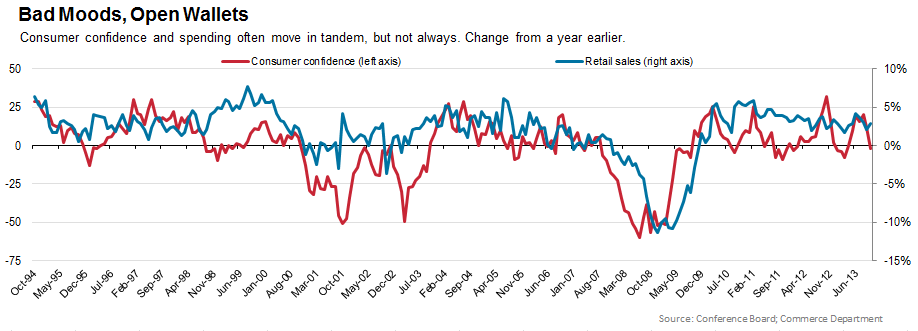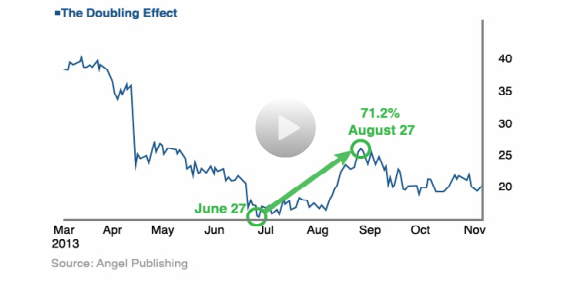Gold & Precious Metals


1. THE SHUTDOWN DID NOT SHUT DOWN SHOPPING
2. THE FED’S NEW MANTRA: “IN COMING MONTHS”
3. IS THERE ANY INFLATION?
4. HOUSING DEMAND STARTS ITS OWN TAPER PROCESS
5. COMPANIES SHELVES ARE GETTING FULLER
….for details go HERE

(Reuters) – Google Inc (GOOG.O) will offer a prepaid debit card that will allow consumers to purchase goods at stores and to withdraw cash from ATM machines, the Internet company said on Wednesday.
The card, which is only available in the United States, lets consumers access the funds stored in their Google Wallet accounts. Google Wallet is a smartphone app and online payment service that lets consumers buy goods and transfer money to each other.
The new Wallet card will be accepted at “millions of locations” that accept MasterCard and at ATM machines, Google said in a post on its official blog on Wednesday. Google said the card is free and that the company will not charge cardholders any monthly or annual fees.
The card could help advance Google’s efforts to play a bigger role in commerce and provide the company with valuable information about consumer shopping habits, though it appears to be less ambitious than the full-fledged credit card once rumored to be in the works.

as China, Fed concerns sour mood….
Downbeat China manufacturing activity added to gloom in most Asian stock markets on Thursday, while emerging market currencies faltered as the dollar charged ahead after the U.S. Federal Reserve’s latest minutes hinted at stimulus tapering.
European shares fell on Thursday, led by financials, after the Federal Reserve signalled it may start withdrawing its monetary stimulus in the next few months. Weak data from China aggravated the decline.
Minutes of the Fed’s Oct. 29-30 policy meeting showed bank officials felt they could start scaling back the asset-purchase programme at one of its next few meetings if economic conditions warranted it.
“Talk of tapering is coming back into the markets, so the recent consolidation in the markets may be expected to continue at least until the Fed meeting next month,” Jawaid Afsar, sales trader at SecurEquity, said.
The FTSEurofirst 300 was down 8.07 points, or 0.6 percent, at 1289.31, by 0824 GMT, echoing Wall Street, which reversed course after the Fed minutes on Wednesday.
The loose monetary policy adopted by central banks globally has fed the rally in equities — European shares are up around 13 percent in 2013 — and eroded returns from other asset classes such as bonds and cash.
Banks, those most acutely exposed to the benefits of monetary stimulus, fell 0.7 percent.
MSCI’s broadest index of Asia-Pacific shares outside Japan .MIAPJ0000PUS shed about 1.2 percent, at one point touching its lowest point since late last week. The softer China manufacturing and Fed speculation also weighed on emerging market currencies, sending the Indonesian rupiah to its lowest mark in nearly five years.
But Japan’s Nikkei stock average .N225 bucked the region, surging 1.9 percent as the yen weakened to a four-month low against the dollar, and on plans by a major government fund to invest more of its $2 trillion funds in riskier assets.

JPMorgan agreed to pay a record $13 billion following a probe of its mortgage operation, Washington Mutual bad loans, and mass waivers on misrepresented products.
Specifically, JPMorgan knowingly bundled toxic loans into packages sold to unsuspecting investors.
But all’s well that ends well.
JPMorgan was assessed a $13 billion fine but apparently did nothing wrong. As an added bonus, $7 billion of that $13 billion settlement is tax deductible.
Please consider JPMorgan $13 Billion Mortgage Deal Seen as Lawsuit Shield
JPMorgan Chase & Co. (JPM)’s record $13 billion deal to end probes into mortgage-bond sales may save the bank billions more because of what the agreement lacked: an explicit admission of wrongdoing.
Employees of JPMorgan and two firms it acquired knew some of the loans included in bonds didn’t meet underwriting standards, a fact not shared with buyers of those securities, the U.S. Justice Department said yesterday in a statement. That doesn’t mean the company misled investors, said Chief Financial Officer Marianne Lake, disputing how some state and federal officials characterized the deal.
No Admission
“We didn’t say that we acknowledge serious misrepresentation of the facts,” Lake said yesterday in a conference call with analysts. “We would characterize potentially the statement of facts differently than others might.”
JPMorgan acknowledged the statement of facts — the settlement’s official narrative of events leading up to the infractions — without admitting violations of law, Lake said. The bank also denied any violations in an accompanying slide show.
Separate agreements with the Federal Deposit Insurance Corp. and National Credit Union Administration, both disclosed yesterday, and an accord last month with the FHFA all contained explicit denials of wrongdoing by JPMorgan.
Attorney General Eric Holder said in a statement. “JPMorgan was not the only financial institution during this period to knowingly bundle toxic loans and sell them to unsuspecting investors, but that is no excuse for the firm’s behavior.”
U.S. Attorney Benjamin Wagner in Sacramento, California, said a criminal investigation of the bank’s conduct in the sales of residential mortgage-backed securities began less than a year ago, and while “active and ongoing,” isn’t far enough along to say whether anyone will face charges.
The six biggest U.S. banks, led by JPMorgan and Charlotte, North Carolina-based Bank of America Corp., have piled up more than $100 billion in legal costs since the financial crisis, a figure that exceeds all of the dividends paid to shareholders in the past five years, according to data compiled by Bloomberg.
Penalty for Doing Nothing Wrong
As compensation to homeowners for doing nothing wrong, JPMorgan will devote $4 billion to consumer relief for affected homeowners, including principal forgiveness, loan modifications and efforts to reduce blight.
Tax Deductions
JPMorgan’s $2 billion penalty (also for doing nothing wrong) isn’t tax deductible, but $7 billion in compensatory payments are, according to Chief Financial Officer Marianne Lake in the conference call.
Ongoing Investigations
Bloomberg notes “The firm is still the subject of Justice Department probes into its energy-trading business, recruiting practices in Asia and its relationship with Ponzi scheme operator Bernard Madoff.”
Expect those (nothing to see here, so please move along charges) to be swept under the rug as well, also with corresponding tax deductions, and of course “no admission of wrongdoing” by anyone.
Mike “Mish” Shedlock
http://globaleconomicanalysis.blogspot.com














